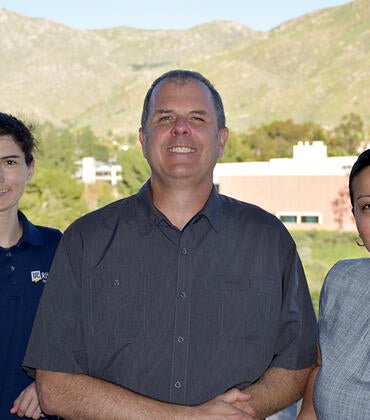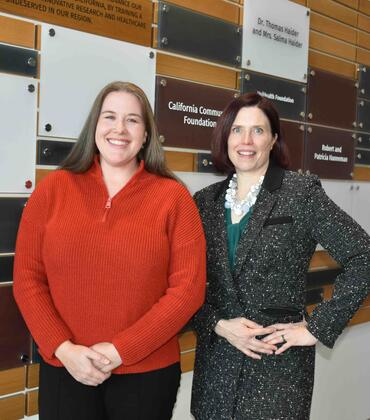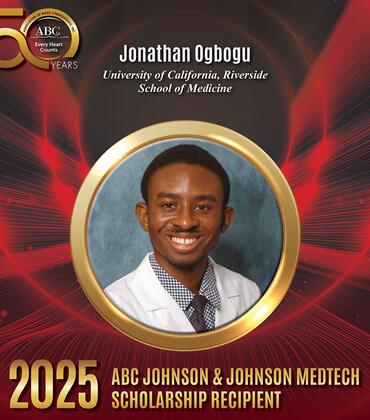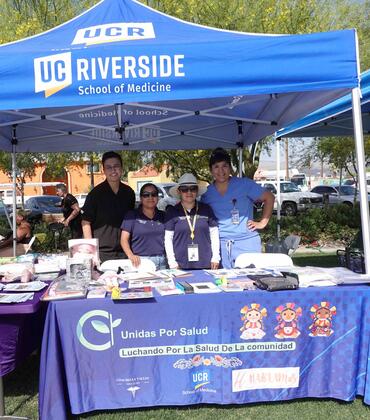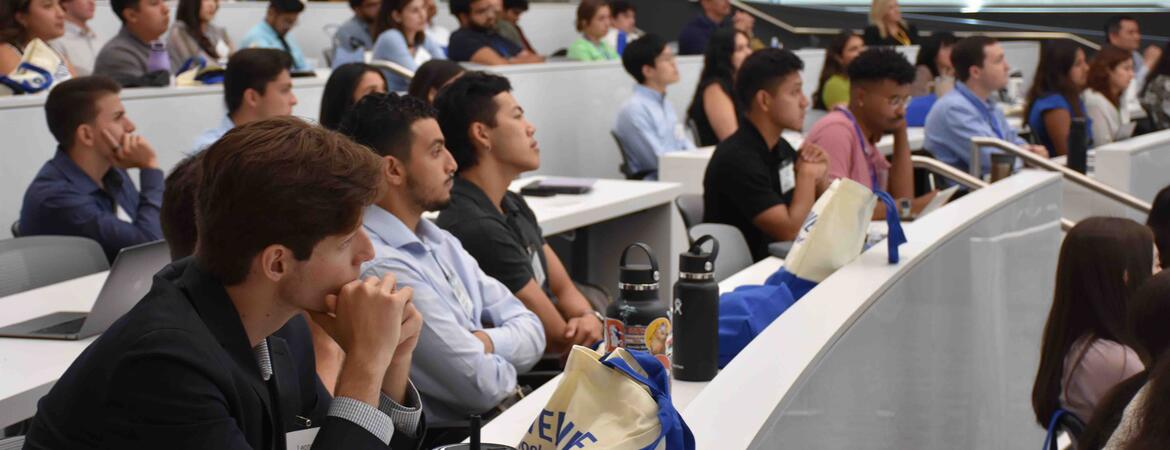
While studying for the United States Medical Licensing Examination (USMLE) Step 1, UCR School of Medicine student Daniel Vasquez found himself plateauing on practice tests with a score just below the passing range. So, he made an appointment with Christina M. Granillo, PhD, director of the Office of Academic Success and an assistant clinical professor of Health Sciences. “I talked with Dr. Granillo because I wanted to see what kind of magic she could do to help me improve past the point that I was hitting a wall,” said Vasquez, now in his third year.
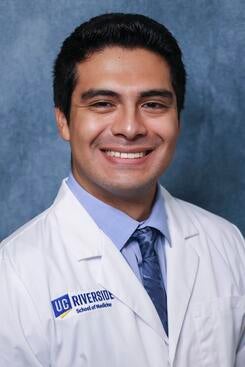
He passed the next practice test he took. “I felt very proud, I was very excited and very motivated to continue to push,” he recalled. “She helped me break through that wall, and I found this new motivation to say, ‘Hey, I can do this.’”
Vasquez enrolled at the UCR School of Medicine after a break from school and quickly realized he needed to readjust his study habits. He said Granillo gave him tips specifically catered to his work style to help improve his studying and pass Step 1. Yet even for students who enter medical school with recent school experience and solid study skills, academic coaching can still help. “If we're doing our jobs well, we help them to solidify the skills they're going to need to be lifelong learners, because in the medical profession they never stop taking tests,” Granillo said.
She pointed out that even Olympic athletes work with a team of coaches. “And oftentimes it's students that have no academic difficulties that are proactively saying, ‘I just want to talk to you, make sure that there's nothing I'm missing,’” she added.
Granillo’s office schedules appointments with all students, regardless of academic performance. Her office also schedules an appointment with every SOM student during their second year of medical school to prepare for the Step 1 exam. “Students come back as often as they want until they feel secure and confident, but if we’re doing our job, we’re helping students get their feet under them so they don’t need us anymore,” she said.
Not only does the appointment benefit students, Granillo said, it also helps change the culture to remove the stigma surrounding tutoring and support services. “It's still not easy because you've got a new cohort every year where they were the tutors and the ones that people came to, and now they can't do that,” she said. “I think it is just a lot of messaging that we're here and we're trying to identify what works for you.”
Understanding issues then teaching study strategies
Sessions with the Office of Academic Success usually start with an in-depth discussion. “I think students come and they think we’re going to tell them what to do,” Granillo said. “The appointment consists of us asking lots of questions in the 30-minute meeting to understand them before we get to the point of providing guidance.”
In Vasquez’s experience, “Medical school is overwhelming, but they're there to help you figure out what works best for you and how to succeed,” he said.
Coping with volume
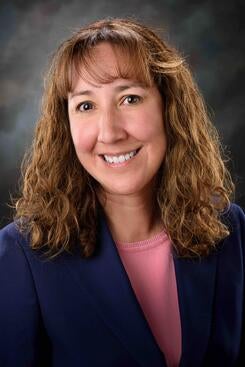
A common issue that many medical students deal with is simply the high volume of information they encounter. “They’re super smart, super capable, obviously successful test takers because they got into medical school,” Granillo said. “But it's the volume of information that they have to manage every week and then be tested on; that's the difference.”
One way to approach this issue is by focusing on the relationships between each concept then organizing the material, such as into a chart. “A lot of students need help with understanding that piece of it, because it's very easy to think you can memorize your way through it all, and you can't,” Granillo said.
This leads to the ability to eliminate wrong answers, a valuable strategy on tests when students are unsure of the correct response. Granillo emphasized that using the process of elimination doesn’t reflect poorly on a student’s knowledge. “It's understanding that it's okay to not know everything,” she said. “It's an opportunity to say, ‘I'm almost there.’”
Using feedback effectively
Medical students take quizzes to identify areas that need additional work, but they may not know how to leverage the results to improve on their own. “If you couldn’t answer a question, and you've studied all the material, that means there's a disconnect, and let's help you find it,” Granillo said.
Planning ahead over cramming
Another frequent issue among students is cramming, a practice Granillo said she used herself as a student. “If you stay up all night before a big test, you're not your best self,” she said. “If we're stressed, we're not emotionally in the best mindset to pick the right answer.”
To help with this issue, Granillo recommends planning ahead. “Look at the calendar and upcoming topics and know where you’re going,” she explained. This applies to individual lectures, too. She suggests taking 10 minutes to look over the slides in advance to know where the lecture is heading. “It’s an organizational thing that helps so you know what to write down,” she said.
Prioritization is another important part of planning. “One of the best tips I’d share is Dr. Granillo’s advice about if something on your checklist keeps getting pushed off, move it to the first thing you do in the day, so it never gets missed,” said Christina Stirwalt, currently a fourth-year medical student who began working with Granillo during her first year at the SOM.
Don’t retype lectures; do create study guides
Many students, Granillo said, enter medical school with the habit of retyping lectures. However, she said there simply isn’t time to keep this up. “If there are four lectures in a day, and each one is taking three hours, we should already be sleeping,” she pointed out. “And that's just rewriting--that's not doing that compartmentalizing, comparison, memorization, all those other steps.”
During students’ first year, Granillo recommends they create condensed study guides, writing the main points in their own words with a focus on concepts that are causing them difficulty.
Vasquez seconded her advice. Whether individuals’ most effective study strategy is creating flashcards or annotating slides, “You want to find that in this beginning period, because you have time to experiment and learn what works best for you,” he said.
Lifestyle tips
Academics aren’t the only challenge in medical school, so Granillo’s suggestions often extend beyond study habits into lifestyle ones. “Sometimes struggling on a quiz or feeling like they’re not doing okay with the academics is the tip of the iceberg,” Granillo said. She tries to understand the core issue and suggest resources, whether that’s scholarships for fuel or checking in with the wellness team, as well as share lifestyle-focused tips.
The importance of sleep
Sometimes students may feel that they don’t have enough time for sleep, but rest is critical both for health and schoolwork. “There's all sorts of science that says sleep actually allows for connections to be made in the brain,” Granillo said.
She suggests intentionally setting an end time for studying to then wind down for bed. “We should not fall asleep listening to something that has to do with school or doing Anki flashcards on the phone; this is your time to rest and recover,” she said.
Schedule breaks
Just like setting aside time for sleep, Granillo also recommends scheduling breaks. Specifically, she advises putting everything from study and clinic hours to driving time on a calendar, along with time to go to the gym or visit home for the weekend.
This may include a negotiation of how much time to take off. “Sometimes they’re so stressed they can't even have fun on breaks, so we look at their week and decide when they feel okay doing things,” Granillo said.
Foster a growth mindset
Another piece Granillo touches on is mindset and the importance of focusing on improvement. This means seeing setbacks as an opportunity rather than internalizing them or viewing them as personal failings.
This approach helped Vasquez when his Step 1 practice test score briefly faltered following his initial success. “The memorable thing was Dr. Granillo said, ‘It's not a problem with you, it's not that your studying is inadequate,’” he said. “She gave me so much reassurance in that, what happened, happened, and that's okay, and you can still improve from this.”
For Stirwalt, “Dr. Granillo taught me to approach challenging or unfamiliar material with curiosity,” she said. “This keeps my mindset clear and helps to reduce feelings of panic.”
Adjusting over time
As students enter or progress through medical school, Granillo pointed out that they shouldn’t get rid of good habits they already have. “They can stumble because they get to this new environment and throw out everything from the past that was helpful,” she explained.
Still, some adjustments may be necessary, such as with the transition from year one to year two when students gain access to different resources and focus on preparing for Step 1 while handling new stress levels. “Even every block, there might be a little adjustment of how you do things because some material might seem easier and other things are harder,” Granillo added.
Throughout this process, Granillo advised students to let go of study habits that aren’t working for them, even if they’re a popular tool. “I hear from students asking permission to stop using flashcards because they're soul-crushing,” she said. “So I say let's not use it, because we have been successful memorizing however you do that.”
Normalizing struggles
Many students face impostor syndrome at some point, feeling they’re not good enough to be in medical school. “Sometimes it's just reminding them, you're good, you are here, that means you can do this,” Granillo said.
“Life still happens as a medical student,” she continued. Granillo said she wishes that more students were open about their struggles, because everyone faces challenges. “Nobody in the world wants to be vulnerable, and then this is a very unique, pressure-filled environment with high-performing people, so it's tough to show that everything's not okay,” she said.
For Vasquez, “We've all been in your shoes of how hard it is getting into medical school and going through medical school,” he said. “And I still have more steps to go through medical school too, but, we’re rooting for you and everyone's here to help you.”
Granillo hopes more students share their experience of working with the Office of Academic Success to encourage other students to seek support. “Success in medical school is knowing when to ask for help,” she said. “As long as you want to be a doctor, we're here with you.”
